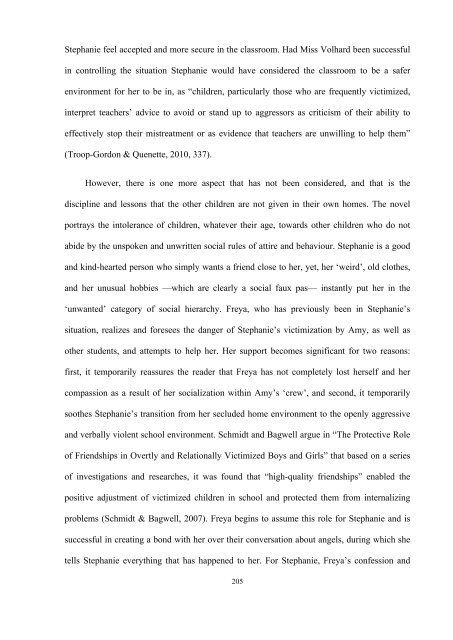The secular angel in contemporary children's literature: David ...
The secular angel in contemporary children's literature: David ...
The secular angel in contemporary children's literature: David ...
You also want an ePaper? Increase the reach of your titles
YUMPU automatically turns print PDFs into web optimized ePapers that Google loves.
Stephanie feel accepted and more secure <strong>in</strong> the classroom. Had Miss Volhard been successful<br />
<strong>in</strong> controll<strong>in</strong>g the situation Stephanie would have considered the classroom to be a safer<br />
environment for her to be <strong>in</strong>, as “children, particularly those who are frequently victimized,<br />
<strong>in</strong>terpret teachers’ advice to avoid or stand up to aggressors as criticism of their ability to<br />
effectively stop their mistreatment or as evidence that teachers are unwill<strong>in</strong>g to help them”<br />
(Troop-Gordon & Quenette, 2010, 337).<br />
However, there is one more aspect that has not been considered, and that is the<br />
discipl<strong>in</strong>e and lessons that the other children are not given <strong>in</strong> their own homes. <strong>The</strong> novel<br />
portrays the <strong>in</strong>tolerance of children, whatever their age, towards other children who do not<br />
abide by the unspoken and unwritten social rules of attire and behaviour. Stephanie is a good<br />
and k<strong>in</strong>d-hearted person who simply wants a friend close to her, yet, her ‘weird’, old clothes,<br />
and her unusual hobbies —which are clearly a social faux pas— <strong>in</strong>stantly put her <strong>in</strong> the<br />
‘unwanted’ category of social hierarchy. Freya, who has previously been <strong>in</strong> Stephanie’s<br />
situation, realizes and foresees the danger of Stephanie’s victimization by Amy, as well as<br />
other students, and attempts to help her. Her support becomes significant for two reasons:<br />
first, it temporarily reassures the reader that Freya has not completely lost herself and her<br />
compassion as a result of her socialization with<strong>in</strong> Amy’s ‘crew’, and second, it temporarily<br />
soothes Stephanie’s transition from her secluded home environment to the openly aggressive<br />
and verbally violent school environment. Schmidt and Bagwell argue <strong>in</strong> “<strong>The</strong> Protective Role<br />
of Friendships <strong>in</strong> Overtly and Relationally Victimized Boys and Girls” that based on a series<br />
of <strong>in</strong>vestigations and researches, it was found that “high-quality friendships” enabled the<br />
positive adjustment of victimized children <strong>in</strong> school and protected them from <strong>in</strong>ternaliz<strong>in</strong>g<br />
problems (Schmidt & Bagwell, 2007). Freya beg<strong>in</strong>s to assume this role for Stephanie and is<br />
successful <strong>in</strong> creat<strong>in</strong>g a bond with her over their conversation about <strong>angel</strong>s, dur<strong>in</strong>g which she<br />
tells Stephanie everyth<strong>in</strong>g that has happened to her. For Stephanie, Freya’s confession and<br />
205
















